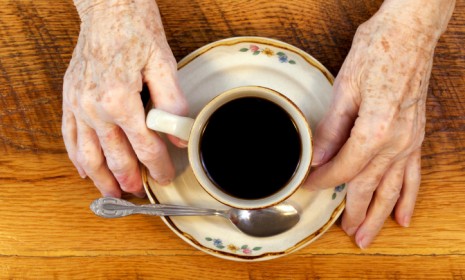How coffee keeps Alzheimer's at bay
New research helps scientists understand exactly how caffeine stops the build-up of degeneration-causing brain plaque

A free daily email with the biggest news stories of the day – and the best features from TheWeek.com
You are now subscribed
Your newsletter sign-up was successful
Want to ward off Alzheimer's? Start your day off with a cup of joe. It's long been known that the caffeine in coffee helps keep neurodegenerative diseases like Alzheimer's away by suppressing the build-up of brain-clogging plaque. But scientists haven't been entirely sure how coffee wards off brain plaque — until now. New research suggests that caffeine helps put a stop to a dangerous chain reaction in the brain that leads to clogging, therefore allowing the neural circuitry to operate fluidly. Here, a brief guide to coffee's mind-protecting powers:
What causes Alzheimer's, exactly?
Experts aren't 100 percent sure, which is why treatments and a cure have been so hard to develop. Still, scientists generally agree that neurodegenerative disorders probably have something to do with the build up of amyloid plaque that clogs the brain's passageways, depriving it of the blood and oxygen it needs to function properly. Now, researchers from the University of Illinois think they've pinpointed exactly how caffeine helps prevent crippling brain inflammation.
The Week
Escape your echo chamber. Get the facts behind the news, plus analysis from multiple perspectives.

Sign up for The Week's Free Newsletters
From our morning news briefing to a weekly Good News Newsletter, get the best of The Week delivered directly to your inbox.
From our morning news briefing to a weekly Good News Newsletter, get the best of The Week delivered directly to your inbox.
How did they conduct their study?
Researchers looked at the brains of two groups of mice. To create a cognitive impairment, researcher Gregory Freund forced a process called hypoxia, which interrupts breathing and blood flow. The mice were allowed to recover and were then administered tests that measured their ability to form new memories. One group of mice was given caffeine, while the other group didn't receive any.
What happened?
Mice who received caffeine were able to form new memories 33 percent faster than the control group. Freund and his team discovered that caffeine has the same effect as blocking IL-1 signaling (more on that momentarily), which has long been viewed as one of the main sources of inflammation of the brain. "Hypoxia kickstarts a complicated chain reaction that ends in cognitive decline," says George Dvorsky at io9, and caffeine helps stop the domino effect.
A free daily email with the biggest news stories of the day – and the best features from TheWeek.com
What does caffeine do to the chain reaction?
To understand how caffeine stops the chain reaction, you have to go back a few steps: When hypoxia occurs, a rush of molecules called adenosine are released in the brain, and in a long and complicated process, that leakage triggers the production of IL-1, the inflammation-causing component, says io9's Dvorsky. Caffeine blocks the adenosine molecules early on, stopping the leakage before it happens.
So what's the takeaway?
Caffeine's adenosine-blocking properties could lead to powerful new treatments to combat degenerative brain diseases. "We feel our foot is in the door now," says Freund, "and this research may lead to a way to reverse cognitive impairment in the brain."
Sources: BusinessLine, FirstPost, io9, Medical Xpress